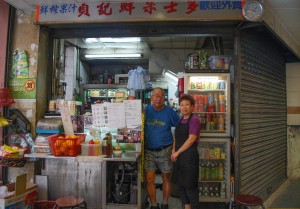Adverse possession cases expected to rise as land disputes between squatters and landowners increase
By Silvia Li and Frances Sit
At first glance, Ching Kee seems like an ordinary neighbourhood food stall. Boxes of fruit are piled in the front of the shop. The blender whizzes away to produce the store’s signature fruit juice mixes. But look closely at the menu and two items stand out: “After the bitter comes the sweet” (苦盡甘來) and “Kept you” (留得住你). The names of the drinks tell the story of how the store’s owners fought for and kept this 100 sq ft store on the ground floor of Ka Ming Court, an industrial building in Lai Chi Kok.
They managed to do so by claiming adverse possession, or squatters’ rights.

Owner Yeung Mau-cheong, who is in his 70s, has worked in the store for 46 years. He and his mother started the business in 1967 on what was then wasteland. Four years later, Ka Ming Court was built around the food store, incorporating it into a part of the building’s ground floor.
The store means a lot to Yeung and his family. It is where he met his wife, Lam Yuet-ching, known affectionately as Sister Ching. Lam recalls how Yeung would serve her drinks from the stall so he could talk to her. Lam took over the running of the stall from her mother-in-law in 1983 and it was named Ching Kee after her.
While running the stall, Yeung and Lam have raised four children. They have also made firm friends with their customers, with whom they regularly play mahjong and go to have dim sum.
One day in 2009, Yeung started receiving lawyer’s letters from the owners’ corporation of Ka Ming Court. The letters claimed the land on which Ching Kee was operating did not belong to the Yeungs but was part of the public area of the building. They warned Ching Kee would be torn down if the Yeungs refused to leave.
After several attempts to reach an agreement with the owners’ corporation failed, the Yeungs felt they had no choice but to fight back using a method suggested by one of their customers – adverse possession.
Adverse possession is a way of acquiring ownership of a piece of land by occupying it for a certain period of time without the consent of the landowner. The Limitation Ordinance (Cap 347) states that if the landowner takes no action to recover his land, his legal title would expire after a period of time.
The required minimal period is 12 years for private land and 60 years for government land in Hong Kong. According to the Law Reform Commission, 74 adverse possession disputes were brought to court between 2007 and 2011.
The Yeungs took their case to court in 2010 and after three years of hearings, they persevered. In the Yeungs favour was the fact they had water and electricity bills to prove their encroachment on the land; also, they had never been asked to pay rent although the owners’ corporation had long known of the shop’s existence.
“Justice exists in everyone’s heart,” Yeung says. “You don’t have any reason to take away the store we’ve been in for so long.”







































